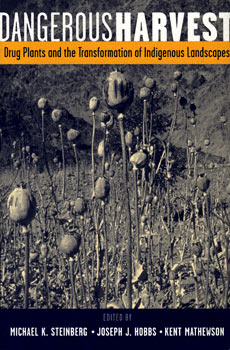
[an error occurred while processing this directive]
Dangerous Harvest presents a global overview of indigenous peoples' relations with drug plants. It presents case studies from various cultural landscapes that are involved in drug production, trade, and use, and examines historical uses of illicit plant substances. It continues with coverage of eradication efforts and the environmental impact of drug plant production. The final chapter synthesizes the major points made and forecasts future directions of crop substitution programs, international eradication efforts, and changes in indigenous landscapes. This book explores the farmer as cast in various roles, from virtuous producer to agent of bice to circumstantial victim. Rather than demonizing or glamorizing those who cultivate drug plants, these studies demonstrate the deep historical, cultural, and economic ties between farmer and crop.
BACK COVER #
The global drug trade and its associated violence, corruption, and human suffering creates global problems that include political and military conflicts, ethnic minority human rights violations, distortions of economic development, and environmental degradation. Drug production and eradication affects the stability of many states, shaping and sometimes distorting their foreign policies. External demand for drugs has transformed many indigenous cultures and landscapes. Traditional subsistence practices, patters, and processes--especially those involving drug plants--are increasingly being subordinated too the demands of complex global networks and markets.Dangerous Harvest presents a global overview of indigenous peoples' relations with drug plants. It presents case studies from various cultural landscapes that are involved in drug production, trade, and use, and examines historical uses of illicit plant substances. It continues with coverage of eradication efforts and the environmental impact of drug plant production. The final chapter synthesizes the major points made and forecasts future directions of crop substitution programs, international eradication efforts, and changes in indigenous landscapes. This book explores the farmer as cast in various roles, from virtuous producer to agent of bice to circumstantial victim. Rather than demonizing or glamorizing those who cultivate drug plants, these studies demonstrate the deep historical, cultural, and economic ties between farmer and crop.


